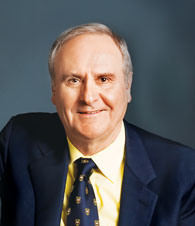|
Executive Interviews: Interview with James O’Toole
on Business Schools and Business Ethics
July 2010
-
By Dr. Nagendra V Chowdary
 James O’Toole
James O’Toole
Daniels Distinguished Professor of Business Ethics at the University of Denver’s Daniels College of Business. 
How has the competition amongbusiness schools changed over theyears? Is heightened competitionanything to do with an increasedfocus on making quick bucks?
In American colleges anduniversities, in general, there hasbeen a shift towards viewing bothgraduate and undergraduate degreesas a source of better jobs, and awayfrom thinking of those four to eightyears as an opportunity to get aneducation that will lead to a full andgood life. More and more Americanstudents see their time in class as acost of getting a good job, and not asan opportunity to learn.
Every business school issupposed to force its students to ask“How do I want to change the worldfor the better?” Does that happen? Oris it overdone?
The only time people can be countedon to talk about b-schools as “forces tochange the world for the better” is atgraduation ceremonies. In the nearlyforty years that I have been involvedin the endeavor, I can think ofperhaps only a dozen professors whoconsistently believed in, and actedon, that premise.
In most of the business schoolsacross the world, academics teachingsoft skills such as leadership, ethicsand values are a distinct minoritywho are in many ways looked downupon because they don’t teach‘frontline’ courses. How can wechange this mindset?
Over the last two decades it hasbecome increasingly hard for thosewho teach such “soft” subjects to gethired, promoted, and tenured inleading B-schools. But there is somegood news: as the result of all theethical scandals in business and onWall Street, it seems there may be aresurgence of concern for such issuesin the offing, although it is probablypremature to claim that there has beena permanent rebalancing between thehard and soft aspects in the MBAcurriculum.
Would the introduction of acourse dealing with leadership,ethics and integrated values meananything when the basic fabric ofbusiness education has not changed?
Your concern is a valid one, but onemust start somewhere. I think thatleadership and ethics, in particular,need to be seamlessly woventhroughout the entire MBA curriculum, even in accounting,finance, and marketing courses, ifthey are to be seen as relevant and tohave any traction with career mindedstudents.
What according to you, obliviousto the business school rankings andhandsomely paid jobs, should be thefive most important things thatbusiness schools should keep doing,should stop doing, and should startdoing?
Let me just offer one modestproposal: transform the institutionsof graduate business education intotrue professional schools along thelines of those offering law andmedical degrees. At medical schoolsan MD professor who specializes indeveloping new surgical methods –publishing the results in practitioner-oriented journals and devoting thetime to the hands-on teaching ofmedical students and interns – isviewed by the institution as the equalof a PhD biologist who spends all thetime in the lab doing theoreticalresearch and publishing reports injournals read only by other scientists(while never getting anywhere nearan MD candidate, let alone a patient). This model has been widely adoptedbecause medical schools view thatthere is a need for them to provideboth scientific research andprofessional training for doctors. Yet,at most of America’s leading b-schools the trend is to hire, reward,and promote only the equivalent ofthe med school’s “pure science”biology professor. In effect, thefaculties at prestigious b-schools (and their wannabes) are increasinglycomposed of discipline-orientedprofessors, researchers who seethemselves as say, economists andpsychologists, and who know (orcare) little about the practical world ofbusiness organizations, or aboutteaching MBAs or about how to leadthem. Hence, I would propose that b-schools halt this trend by adopting aprofessional school model thatembraces faculty pluralism. Likemedical schools, b-schools need bothrigor and relevance and, if those twocharacteristics can be found in asingle professor, so much the better.But failing that – as most often is thecase – both discipline-oriented andpractitioner-oriented faculty need tobe hired (and then rewarded equallyto prevent the formation of theinvidious distinctions that invariablyarise in highly stratified, two-classsystems).
The Interview was conducted by Dr. Nagendra V Chowdary, Consulting Editor, Effective
Executive and Dean, IBSCDC, Hyderabad. This Interview was originally published in Effective Executive, IUP, July 2010. Copyright © July 2010, IBSCDC
No part of this publication may be copied, reproduced or distributed, stored in a retrieval
system, used in a spreadsheet, or transmitted in any form or medium – electronic,
mechanical, photocopying, recording, or otherwise – without the permission of IBSCDC. |
